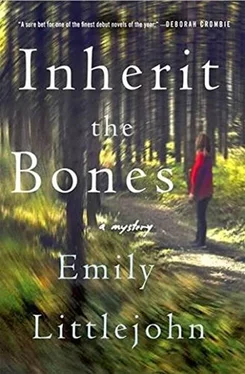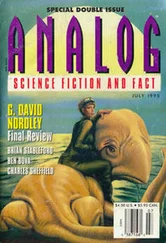He laughed, his smile appearing a millisecond before the sound came through the line. “That looks almost as good as all the salmon I’m eating. It is so beautiful here, Gemma. You’d love it. We’ll be back in Denali for a few days, then back to Anchorage at the end of the week and then I’ll be home.”
This was his third trip to Alaska in six months. He was a contract geologist for the federal government, doing all sorts of technical scientific things I didn’t pretend to understand. At the moment, his work involved a top-secret mineral deposit that had been discovered in some ridge or another in Denali National Park. Apparently Brody was one of about five people in the world that could understand its importance.
“I miss you. It’s been a rough few days,” I said.
Brody’s face blurred in and out of focus and I heard something that sounded like “mumble mumble line mumble gee.”
“Uh-oh, hon? Are you there?”
I tipped the laptop screen back and forth and he reappeared for a split-second. He was talking over his shoulder to someone behind him, someone I couldn’t see, and then he came back to me. I caught a glimpse of a bright pink parka, feminine and fitted, and then Brody’s face filled the computer screen. “Honey, I gotta go. Love you both.”
“Hey, is that Celeste? Jesus Christ, Brody, is that Celeste Takashima?”
He touched his fingers to his lips and then to the screen. Then he was gone.
And… the days just keep getting worse. If that was Celeste Takashima, I was going to kill Brody when he got home.
My mood foul, I finished my breakfast and then I showered and dressed, all the while trying to give Brody the benefit of the doubt. Pink Parka could have been anyone: the bush pilot, the bush pilot’s wife, some other world-renowned, highly specialized female scientist that I’d never heard of. Maybe Brody was surrounded with snow bunnies all eager to service the man.
Bull’s words came back to me: people change. I pushed down the terrible thoughts trying to claw their way out of my heart and tried to focus on the job at hand.
Seamus followed me around, and I explained to him how frustrating it was to struggle with the buttons on my shirt, a struggle I hadn’t had a few days ago. The baby was growing by the minute. I was already in the largest women’s size the station stocked. I’d be moving into the men’s sizes in another week.
After that I might as well wear a muumuu. God, Finn Nowlin would have a field day if I walked into the station in a muumuu, my handgun on one hip and a radio on the other. If it came to that I was just going to retire and journal my eating habits on a blog. I’ve heard people can make big bucks doing that, taking pictures of their meals and posting it for the whole world to see.
I headed out of town, my thoughts dancing between two big questions: Who killed Nicky? And what really happened on that beautiful July day three years ago?
It didn’t make sense, any of it.
The story of Nicky Bellington for three long years has been one of fate. A tragic slip and a long fall; a matter of timing and improper footwear and recent rains and whatever else you could attribute to the cause of the accident.
But Nicky didn’t die. And that changed everything: how we looked at the accident; his family; his life. I thought about Ellen’s strange question: is it different, being the parent of a murdered child as opposed to a child who’s died in an accident? I thought there was a difference there, but I couldn’t see what it was worth, or what it meant. It seemed to me that with murder comes intent, whereas with an accident comes fate.
I realized, as I took a hard right on the steering wheel and headed to the south part of town, there was another question that needed to be answered. Who was the real victim here: Reed? Or Nicky?
I arrived at the fairgrounds shortly before ten. The sun was an orange orb in a blue silk sky. There was a sharp quality to the sunlight that only served to highlight the trash and dirt of the Fellini Brothers’ Circus of Amazements. I put on my sunglasses and walked to the box office at the front of the fairgrounds, watching where I stepped. The grounds were littered with evidence of visitors. Empty soda cans and cups and crumpled foil wrappers lay scattered among orange rinds and apple cores and paper plates and those cardboard tubes that cotton candy is wound upon.
In the distance, just beyond the red and white stripes of the big top, a man swept trash into a large bag, pausing every few seconds to wipe his brow and adjust his grip on the broom. The air was heavy with the smell of rotting fruit and farm animals. I heard children crying, their voices rising together in panic, and I moved in the direction of their cries until the scent hit me and I realized it was not children, but goats.
Joseph Fatone met me at the closed ticket-taker stand. He was in his early seventies; deep grooves made parallel vertical tracks on his forehead and continued down to bookend his mouth. An unlit cigar hung from his thin pale lips and he patted at the four strands of hair on his head as though making sure they were still there.
“Thanks for meeting me here. It’s hard to get away, especially at a time like this. We’re all devastated, our family has been broken,” he said, his words garbled around the Cuban.
He offered me his hand and I shook it. It was clammy and damp and I resisted the urge to wipe my palm on the seat of my pants. Fatone pointed to an Airstream trailer just beyond the box office and we walked toward it. On the ground, orange raffle tickets lay among the trash like trampled poppies in a field.
“The family?”
Fatone nodded and held the trailer door open for me. “Yes, we’re a big family around here. Reed was a son, a brother to us all. He was a real great kid, full of heart and vigor. You don’t meet too many kids with vigor these days. Vigor went out of style fifty years ago.”
The air inside the trailer was musty and smelled of tobacco and lemon Pledge and burnt coffee grounds. Fatone gestured at the tiny kitchen table with its two mismatched plastic chairs and I carefully lowered myself into the one on the right. There was barely an inch between my belly and the edge of the table and I scooted back in the chair as far as I could.
Fatone sat across from me and picked up a chipped mug.
As he drank, I took a look around the trailer. It seemed to be his office and his home. There was a narrow, unmade bed behind a halfway open door near the back of the Airstream. A stack of dishes filled the tiny kitchen sink. The prints on the walls were hunting and fishing scenes clipped from various men’s magazines, mounted in cheap black plastic frames. A sad-looking spider plant hung out of an old coffee can, its tips brown and brittle.
Fatone took another long sip from the mug and his next words wafted toward me on a breeze of booze.
“I still can’t believe he’s gone. I keep expecting him to turn up at the door with T, hollering that the elephants have gotten loose or that he needs to borrow the car. He was such a jokester, that one. A real wise guy.”
He took another sip from the cup and coughed. I smelled tomato juice and put my money on a Bloody Mary.
“T?” I asked.
“Tessa O’Leary. Calls herself T. She and Reed were, uh, well… you know. Going together,” Fatone said. He touched his head again, found the hairs intact, and returned his hand to his lap.
“Dating?”
In the window behind me, I heard the angry buzz of some small insect beating itself against the pane, too desperate to get out of the trailer to notice the open door a few feet away.
He nodded. “Yup, ever since Omaha. Oh, they were friends before that, everyone is friends, you know. But eventually, they all pair up, even the old ones. Everyone’s got a partner.”
Читать дальше

![Лаура Бренз - Потомственная ведьма[Inherit the Witch]](/books/79609/laura-brenz-potomstvennaya-vedma-inherit-the-witch-thumb.webp)










